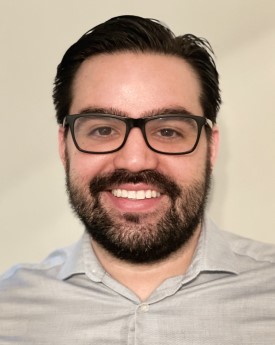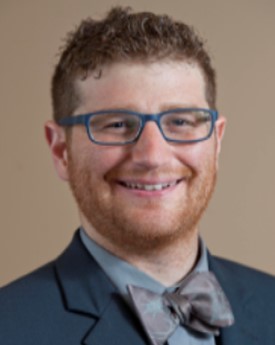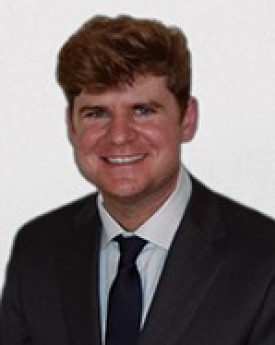Physician-Scientist Projects - Psychiatry Residency

Mark Kvarta, MD, PhD
2021 PSTP Graduate
PSTP Project: Stress, genetics, and neuroimaging of depression in serious mental illness
Depression is a devastating, deadly and costly psychiatric disease. It is most commonly treated – often unsatisfactorily – by manipulating synaptic serotonergic tone, yet the key substrates that mediate antidepressant efficacy are largely unknown and a better understanding of the etiology and neurobiological pathophysiology is needed. One thing is clear; stress plays a role underlying depressive symptoms for many individuals, with a stress-diathesis model of environment at critical timepoints interacting with genetic vulnerability to contribute to illness. Expanding from my doctoral thesis work studying the role of chronic stress in perturbing synaptic function in key corticomesolimbic brain areas in depression, I worked with Dr. Hong to train in clinical and translational research in this area, gaining skills in genetics, functional neuroimaging and stress- based tasks in human participants. I have continued to develop my research projects in these areas now as a faculty member at University of Maryland School of Medicine and the Maryland Psychiatric Research Center, while also attending in the academic outpatient clinic.
My PSTP experience:
As an MD/PhD trainee graduating from the University of Maryland, I knew firsthand the strength of neuroscience research housed at UMSOM, the key attraction that brought me here over a decade ago. The training towards clinical excellence is only further sharpened by the unique partnership with Sheppard Pratt Hospital. The formal research track in psychiatry through the PSTP is a unique opportunity to bridge these two strengths of clinical and research distinction. The outpouring of support and enthusiasm as a research-track resident I constantly enjoyed in the track was remarkable, even more so for the broad scope of clinical training taking place in tertiary, state, private and community hospitals, forensic settings, psychotherapy offices, substance abuse clinics and emergency rooms. I was fortunate to have developed mentorship from faculty of all interests and experience, from purely clinical to purely research and everywhere in between, extending well beyond the mentorships formally arranged. The dedicated research time and close research mentorship were keys to my research productivity and success during residency. It is clear that there is a shared vision to advance psychiatry through development and translation of cutting-edge neuroscience with a new generation of biological psychiatrists.

Gustavo C. Medeiros, MD
2021 PSTP Graduate / Mood Disorders Fellow at The Johns Hopkins University School of Medicine
PSTP Projects:
- Impact of psychiatric comorbidities in antidepressant efficacy treatment with ketamine and esketamine: A meta-analysis
- Too much stress; a critical assessment of the use of animal models of stress to study depression
- Analysis of biomarkers of ketamine response
Primary mentor: Todd D. Gould, MD
Secondary mentor: Carlos Zarate, MD (NIMH Intramural Program)
During my time at the PTSP, I worked on projects focused on biomarkers of response to ketamine. Together with my mentors, I conducted a systematic review/meta-analysis, which was published in Molecular Psychiatry, that summarized the available evidence on blood-based biomarkers of response to ketamine and esketamine. This systematic review/meta-analysis was a great way to get familiarized with the topic and to examine promising biomarkers that warranted further research. In addition, I worked with original data from clinical trials with ketamine that were conducted in the National Institute of Mental Health. Specifically, I examined the impact of ketamine on blood levels neurotrophic factors such as brain-derived neurotrophic factor and vascular endothelial growth factor. This work led to a publication at Journal of Affective Disorders.
My PSTP experience:
I transferred to the PSTP from a similar research track residency at University of Texas Southwestern Medical Center. My experience at the University of Maryland was phenomenal. There is a strong interest in developing trainees with a research background, and the fact we have protected time for research and great support from faculty facilitates and expedites our research projects. The highlight of my experience was working with my primary mentor. Dr. Gould is a knowledgeable, encouraging and approachable mentor who truly wants the development of his trainees. He has an amazing research network and is very efficient in connecting us with other investigators when needed. Dr. Gould was a great role model, and our collaboration continued beyond my time as a trainee at the University of Maryland.
Current Research:
After finishing my residency at the University of Maryland/Sheppard Pratt, I joined the Mood Disorders Fellowship at Johns Hopkins University School of Medicine. At Johns Hopkins, 30% of my time is dedicated to clinical care – mostly working with patients dealing with treatment-resistant depression – and 70% is dedicated to research activities. My main research focus is to find predictors of response to antidepressants, particularly ketamine and esketamine, in the context of precision psychiatry. My goal is to develop multivariate predictive models (using demographics, clinical variables, serum biomarkers, neuroimaging, etc.) to accurate distinguish the individuals who are more likely to benefit from ketamine/esketamine from those who are not. I will soon be submitting a career development award (NIH K) grant in this area. My research vision is to reduce the gap between research and clinical practice by developing practical and clinician-friendly predictive models that could be easily applied in real clinical settings.

Eric Luria Goldwaser, DO, PhD
2022 PSTP Graduate
Assistant Professor of Psychiatry at Weill Cornell Medicine / New York-Presbyterian Hospital
PSTP Project:
- Development stress and blood-brain barrier integrity in schizophrenia
Primary mentor: Elliot Hong, MD and Peter Kochunov, PhD
Secondary mentor: Scott Aaronson, MD
Endothelial cell monolayers are shared within the body's many vascular systems. A peripheral assessment may provide surrogate information on the blood-brain barrier (BBB) endothelial function in schizophrenia. My doctoral research project was focused on the assessment of endothelial dysfunction in Alzheimer's disease at the molecular and cellular level of the BBB. This current project will extend my prior research experiences in BBB endothelial integrity to schizophrenia at the clinical biomarker level during my PSTP training. The primary goals of this project are to: 1) test the central and peripheral endothelial integrity in schizophrenia which can be assessed with state-of-the-art neuroimaging for BBB integrity, ophthalmologic tools for blood- retina barrier function and peripheral endothelial assays, and 2) ascertain developmental insults as a significant contributor to the endothelial dysfunction in schizophrenia. Neurocircuitry involved in aberrant processing and connectivity may further be explored at the junction between perfusion and metabolism utilizing various diffusion MRI sequences, and to carve out putative targets for non-invasive neuromodulation.
My PSTP experience:
Clinically, what was important to me in a residency program was that I would develop my interest that drew me to psychiatry initially – insight-oriented psychotherapy. My interests in research have grown from the more basic and translational neuroscience level using animal models and cell culture into human, clinical applicability. My background work was in blood-brain barrier damage in the context of neurocognitive and neuropsychiatric disorders – namely Alzheimer's disease and post-operative delirium – which has developed into an interest in neuroimaging tools to investigate the neurovascular unit on a structural and functional level. Since the beginning of my PGY-1 year, the level of support and encouragement as part of the PSTP has been nothing short of exceptional. Importantly, the funding for a serious research project is available and accessible, the mentorship and collaborations are rich and meaningful and the protected time to conduct the research is real, from the start. More than anything, however, I find myself having developed a project that I am passionate about and am eager to build the rest of my clinical neuroscience career on. My goals are to develop the skills needed for a robust clinical trial assessing the neuroanatomy of behaviors, neuroimaging biomarkers of psychotherapeutic interventions and carving out neuromodulatory circuits amenable to non-invasive assays and brain stimulation as a possible adjuvant to psychotherapy.
Current Research:
Upon completion of the PSTP, I accepted a position as an Assistant Professor of Psychiatry at Weill Cornell Medicine / New York-Presbyterian Hospital in NYC to be closer to family. My position entails managing many aspects of the Interventional Psychiatry Program, including clinical trials using novel transcranial magnetic stimulation paradigms. My clinical neuroscience research interests are in using functional brain maps to target desired neural circuits that may influence disease trajectory. I also have bridged my interests in investigating the status of the blood-brain barrier and neurovascular unit more broadly as having a key role in treatment and disease across a range of neuropsychopathologies, like schizophrenia, anxiety and mood disorders. This research uses non-invasive approaches to gather information about the vascular systems of the brain and the periphery to assess how the endothelial cell functions in these clinical areas, building upon the extremely robust training received throughout residency. I similarly have developed my clinical interests in psychedelic-assisted psychotherapy and psychodynamic approaches in the out-patient setting to complement my research.

Andrew van der Vaart, MD, PhD
PGY-4 PSTP Resident
PSTP Project: Neuroimaging of delusions in schizophrenia: Neural circuits as a bridge from genes to specific clinical subphenotypes
Primary mentor: Elliot Hong, MD
Secondary mentor: Seth Ament, PhD
Delusions are a prominent positive symptom of schizophrenia and other psychotic disorders, but the mechanism is not well understood. While it is theoretically possible that a single common pathway underlies all delusions and has merely escaped current detection methods, evidence to date points to the more likely scenario of distinct pathways underlying varied delusional states. To this end, my project seeks to empirically subcategorize delusions and identify corresponding neural circuits and genetic architecture. Among patients with schizophrenia spectrum disorders (SSD), we have used the Peters Delusion Inventory to assess for delusions of multiple types; we subsequently designed our own scale for further differentiation. An ontological aspect of this project is the identification of patient sub-groups based on delusion profiles and comparison between these groups on other clinical measures of schizophrenia. On a neurobiological level, DTI, structural MRI, and resting state fMRI analyses are used to identify brain abnormalities associated with distinct delusion sub-types. Task-based fMRI will allow for further delineation of functional connectivity during delusion-relevant perceptual tasks. Finally, we plan to use genotyping of schizophrenia risk-conferring polymorphisms in a mediation analysis to determine whether these variants confer distinct risk based on sub-types. I believe that mechanistic insights from these studies will contribute to resolving a major problem in psychiatric diagnosis and treatment: the likely etiological heterogeneity of broad diagnostic labels, i.e. "schizophrenia."
My PSTP experience:
I became interested in the University of Maryland PSTP program because of its combined strengths in research and clinical training. The Sheppard Pratt hospital is of world-historic significance in psychiatry, and the Maryland Psychiatric Research Center is a leader in current understanding of psychiatric neuroscience, particularly schizophrenia. I came to this institution with a background primarily in the neurobiology and genetics of addiction, with a dissertation on the molecular pharmacology of ethanol as it relates to risk genes for Alcohol Use Disorder in lab models. During the clinical years of medical school, I became increasingly interested in the phenomenology of psychotic disorders and gained some experience in clinical psychiatry research. When I first came to the MPRC I realized it is truly, not just theoretically, positioned in the space between basic neuroscience and clinical psychiatry. I was upfront about my goal of gaining expertise where I was, so far, naïve: structural and functional MRI. This was met with unwavering support from the program, faculty and upper-level residents. Not only that, but I was encouraged to ask my own questions and design my own project with practical mentorship support. Dedicated research time – and funding – allows this to happen. Such a level of freedom is something that can be hard to even know how to seek out but is invaluable in research training.

Sara Milrad, MD, PhD
PGY-2 PSTP Resident
I am very grateful to have matched into the University of Maryland’s Physician-Scientist Training program. I admire and value the program's commitment to fostering research careers among its residents by providing protected time for research without call and by offering an extremely generous, internally funded start up grant for our projects. On a personal level, I am honored to train as a physician in my hometown of Baltimore, caring for the community where my family has lived for five generations. The realization that I am now a physician-scientist in training at the venerated academic institutions I grew up hearing about is still setting in for me.
As a dancer at Carver Center for Arts and Technology, science and medicine were not part of my aspirations growing up. That all changed after a physiology lecture about the hypothalamic pituitary adrenal (HPA) axis. I graduated with a major in biochemistry and minor in psychology at Smith College. I then moved to New York to work at Weill Cornell Medical College, first in psychiatry research using neural stem cells and then as a clinical research coordinator at the Center for Sleep Medicine.
In my Behavioral Medicine PhD program under the direction of Dr. Michael Antoni, most of my research was within the realm of psychoneuroimmunology (PNI) and psychoneuroendocrinology (PNE), especially as it related to chronic fatigue syndrome/myalgic encephalomyelitis (CFS/ME), a disorder that is overrepresented among women.
Some of the most affecting and formative clinical experiences I had during my medical school psychiatry rotations validated and deepened my focus in the area of women’s mental health, where I was introduced to the role of neurosteroids in the etiology and treatment of psychiatric disorders. I am so grateful I can pursue this research interest under the incredibly supportive Dr. Deanna Kelly while in residency. The feeling of being supported by collaborative research mentors and collegial co-residents that came through so warmly on interview day is very real.

